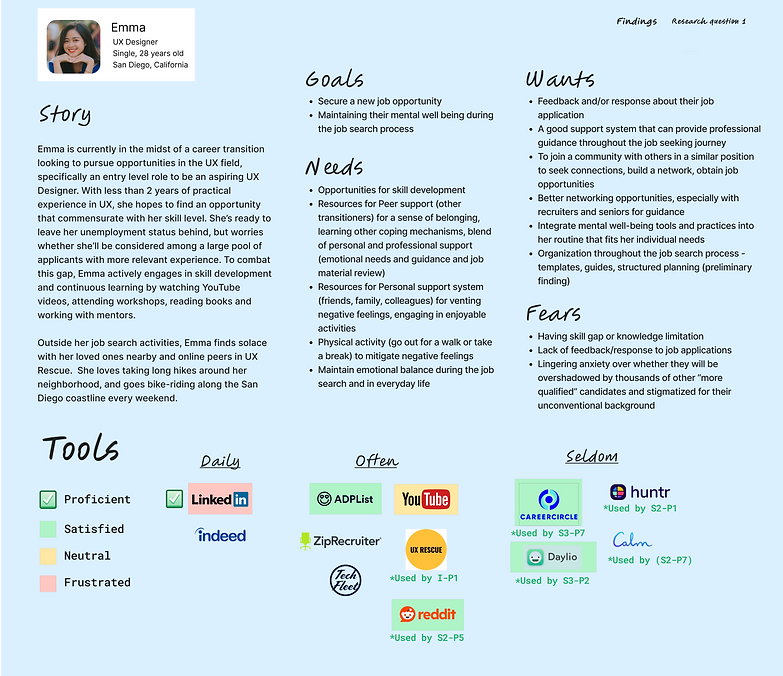Understanding Mental Well-Being: Strategies and Tools for Job Seekers
A THREE-PART SURVEY ON JOB SEEKERS' SUPPORT SYSTEMS AND MENTAL WELL-BEING CHALLENGES
I conducted a three-part survey to learn if job seekers value mental well-being, the tools they use to address it, and their reliance on support systems. This helped shape a proto-persona, better define the problem space, and guide the prioritization of user-centric features.
Context
The product team proposed integrating popular mental well-being features like journaling, time management tools, mood tracking, and meditation exercises into the AmpUp app based on a competitive market study. However, I realized we first needed to understand how job seekers currently coped with emotional challenges. I convinced the stakeholders to take a step back and let my team research work on a proto persona before jumping into feature selection.
My team and I conducted secondary research to define various aspects of mental well-being and created surveys. We allowed construct overlaps in surveys but designed unique survey flows to enable data triangulation. This approach helped us create a holistic picture of the importance of mental well-being for our target users.
MY ROLE
As the lead UX researcher, I planned and conducted stakeholder interviews, designed protocols, analyzed data, refined the journey map, and presented findings. I mentored interns to set up the surveys, recruit and screen participants, clean and analysis data, and write the report.
Research
Study Goals:
-
Survey 1: To understand the role of support system, both professional and personal, in target users’ job search journey and their impact on their mental health
-
Survey 2: To identify the mental wellbeing challenges faced by career transitioners, investigate the resources and tools they use, and gauge the necessity of addressing these challenges.
-
Survey 3: To break down mental wellbeing into key attributes as identified by career transitioners.
Methods:
-
3 surveys on Qualtrics
-
Participants were recruited on various community platforms like Slack, Discord, WhatsApp
User Demographics:
-
A total of 31 participants per survey
-
Age: 18-54 years
-
Ethnicity: Asian, White, Black or Hispanic
-
Gender: 24 females, 4 male, 3 others
-
Aspiring field: UX Design (23/31), UX Research (14/31), Product Management (4/31), Product Strategy (1/31), Data Analyst (2/31)
Outcomes:
-
Proto user persona
-
Emotional challenges of target users
-
defining problem space
Limitations:
-
Limited participants, most of which were females
-
Most users identified as Asian or Caucasian
Outcome
The team was able to develop a proto user persona which could be used as a starting point for persona development.

Findings
Mental Well-being:
-
Mental well being was not the biggest challenge faced during job search.
-
Mental well-being being is interpreted as “ Emotional Stability” (half of users).
-
People felt mental wellbeing was also important but rarely addressed it directly.
Mental Well-being Tools:
-
Biggest challenge during job search is skill gaps, lack of response and job rejections.
-
Cost, effectiveness, integration, and perception as an additional task were major barriers to adopting mental wellbeing tools.
Support Systems:
-
Job seekers reached out to support systems or engaged in upskilling activities to tackle emotional challenges.
-
Talking to recruiters, career transitioners and seniors in their field were felt to be most helpful.
RECOMMENDATIONS
-
Design features should focus on promoting emotional stability, as it is a motivator for users.
-
Tackle the key barriers to mental well-being tool adoption: ensuring cost-effectiveness, demonstrating tools efficacy and seamlessly integration into user workflow.
NEXT STEPS
-
Explore possible ways of helping users alleviate anxiety and overwhelm related to job searching.
-
Explore the effects of mentorship with recruiters, peers or seniors on mental-wellbeing.
Reflection
-
Multi-survey approach allowed comprehensive data collection for complex issues quickly
-
Open-ended questions on open recruitment platforms may lead to AI-generated answers. Future surveys mitigate this issue with disclaimers and requests to avoid AI chatbots.





